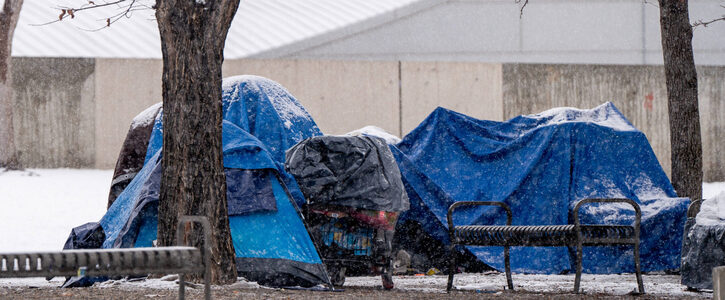1,000 signatures reached
To: The Indianapolis Office of Public Health and Safety | Division of Homelessness and Eviction Prevention
2024 Camp Displacement Moratorium

Indianapolis Community Petition to Stop Camp Displacements - Winter 2024-2025
With the current Winter Contingency plan under-resourced, outreach to our unhoused neighbors is even more critical to connect them to resources and care. For some neighbors, outreach staff may be their only connection to services, and camp displacements disconnect them from this care and erode trust. In light of recent camp closures, we request a moratorium on camp closures and displacements (“sweeps”). A moratorium will ensure outreach staff can locate and support those living unsheltered throughout the winter months and prevent serious harm or death.
Based on best practices and guidance from the National Health Care for the Homeless Council, camp displacements are harmful and counterproductive to our collaborative work. Camp displacements can cause unhoused neighbors to lose vital survival items, cause and worsen mental health conditions, cut neighbors off from live-saving medicine and care, put residents into more dangerous and isolated environments, and cost communities thousands of dollars.
The American Public Health Association firmly states people experiencing unsheltered homelessness deserve to have their health and well-being protected and prioritized and their choices respected. Camp displacements destroy autonomy, safety, and stability for people experiencing homelessness in a system that continues to fail them.
Encampments embrace a community or peers and are often served by a comprehensive network of outreach and service providers. Furthermore, encampment communities often serve as protection from violence and predation, as well as other forms of community safety, such as mental health support and meeting daily survival needs.
Therefore, the Indianapolis community is calling on the City of Indianapolis to place a moratorium on camp displacements for the duration of Winter Contingency (November 1st- March 31st).
Stopping camp displacements can ensure folks maintain access to life-saving medications and medical care, provide an opportunity for individuals to fortify their camp against extreme weather conditions to make it survivable, remain connected to outreach workers and other supports for critical support needs, and allow providers a better chance at locating individuals when safe, sustainable housing opportunities arise.
With the current state of Winter Contingency and contemplating the harm camp disclosures can result in, this moratorium can and will save lives. It will allow people the time and space needed to prepare for surviving the winter and keep them connected to the people and resources that will help keep them alive.
The Indianapolis community implores the city to adhere to Chapter 231 Article V-Protections for the Homeless. Sec. 231-503[1] provides procedures for displacement that we, as a city, are not currently equipped to meet. Specifically, without a clear path or offer of permanent housing, transitional housing, or shelter that is safe, reasonably clean and maintained, and approved by the city, the conditions for displacement cannot be met.
While we are not indicating that there may not need to be camp closures to ensure the health and safety of those living in unsafe, unsheltered conditions, we are requesting a moratorium on camp closures until the process is more transparent and connected to an intentional strategy that reduces the trauma and disruption that displacement causes and until there are adequate housing or interim options for those being impacted by camp closures as we collectively work to scale permanent housing through Housing First approach.
Why is this important?
• Camp displacements can cause unhoused neighbors to lose vital survival items. If replacing these items is even possible, it takes resources away from more sustainable homeless response solutions. Neighbors can also lose vital records such as photo IDs and Social Security cards, which are required for employment and housing and take heavy time and monetary resources to replace.
• Camp displacement – and the fear of displacement – can cause and worsen mental health conditions. In addition to creating feelings of dehumanization and traumatization, sweeps disrupt routine and can cause neighbors to be removed from existing social connections, which can worsen mental health stability.
• Camp displacements can cut neighbors off from life-saving medicine and care. While being displaced, neighbors can lose vital and hard-to-replace medical care for HIV, diabetes, hypertension, substance use and mental health conditions, and other conditions, harm reduction supplies, as well as equipment such as wheelchairs. If outreach staff cannot find neighbors after a camp displacement, these neighbors may also lose their only existing connection to services.
• Camp displacement can put residents into more dangerous and isolated environments. Following displacements, residents may seek safety in more isolated locations. In addition to being more difficult for service providers to access, these locations may lack safe water, bathroom facilities, and escape from the elements. This is especially dangerous if a camp displacement causes a loss of survival equipment that allows them to be protected while living outside in extreme weather.
• Camp displacements cost communities thousands of dollars. This includes personnel costs, medication and medical equipment replacement costs, and vital document replacement costs. Outreach to locate and rebuild trust with displaced neighbors requires additional costs and time.
Our communities rise when we work to lift up our most vulnerable citizens. Please help us stand with our neighbors surviving outside to demand better for our city. We're all in this together!
